Table of Contents
- Introduction
- The Science-Backed Spice Framework for Pot Roast
- Step-by-Step Pot Roast Recipe
- Pro Tips for Perfect Results Every Time
- Visual Guide: Spice Pairings Compared
- Frequently Asked Questions
- Conclusion
Introduction: Why Your Pot Roast Needs a Scientific Spice Approach
For home cooks seeking consistent, restaurant-quality results—whether preparing weeknight dinners or special occasion meals—this guide delivers precision-engineered flavor development. Unlike generic recipes, we reveal how molecular interactions between spices and slow-cooked collagen transform ordinary pot roast into extraordinary dining experiences.
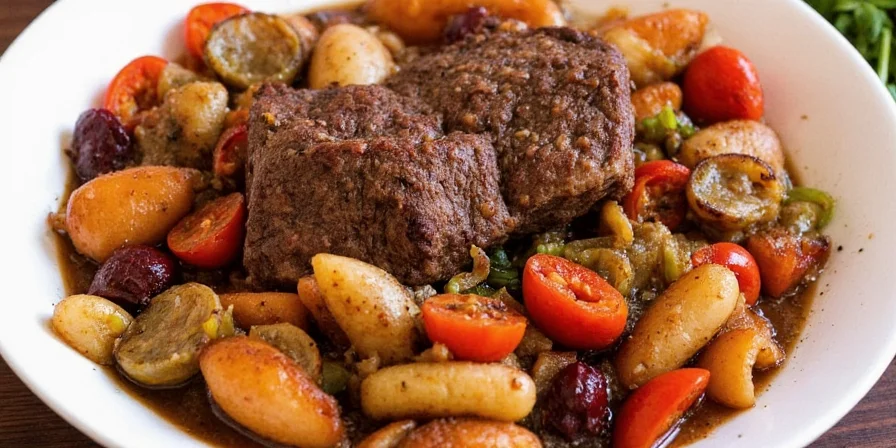
Pot roast mastery hinges on understanding biochemical reactions during slow cooking. This guide targets cooks who've struggled with bland results, providing actionable science to consistently achieve deep, layered flavors through controlled spice deployment.
The Science-Backed Spice Framework for Pot Roast
Move beyond guesswork: Slow cooking triggers two critical processes—Maillard browning (creating 600+ flavor compounds) and hydrolysis (breaking down collagen). Strategic spice pairing amplifies these reactions through solubility principles. Lipophilic compounds (fat-soluble) like thymol in thyme integrate with meat fats, while hydrophilic compounds (water-soluble) like capsaicin in cayenne disperse through braising liquid. This dual-extraction method creates harmonious flavor distribution impossible with random seasoning.
| Spice | Flavor Profile | Role in Pot Roast | Quantity per 3 lb Roast |
|---|---|---|---|
| Salt | Savory, enhances other flavors | Balances sweetness from vegetables, enhances overall savoriness | 1.5 - 2 tbsp |
| Black Pepper | Earthy, sharp | Adds depth and slight heat, activates other spices | 1 tsp freshly ground |
| Garlic Powder | Pungent, savory | Lends umami backbone, blends well with beef | 1 tsp |
| Onion Powder | Sweet, earthy | Complements garlic, adds background sweetness | 1 tsp |
| Paprika | Smoky or sweet, depending on type | Adds color and subtle warmth; great base layer | 1 tsp smoked preferred |
| Dried Thyme | Herbaceous, minty | Classic pairing with beef, especially in braised dishes | 1 tbsp fresh or 1 tsp dried |
For optimal flavor integration, apply spices in two phases: 70% during searing (to bond with surface proteins), 30% added midway through cooking (to refresh volatile compounds). Avoid pre-mixing salt with other spices—its hygroscopic nature draws moisture that dilutes potency.
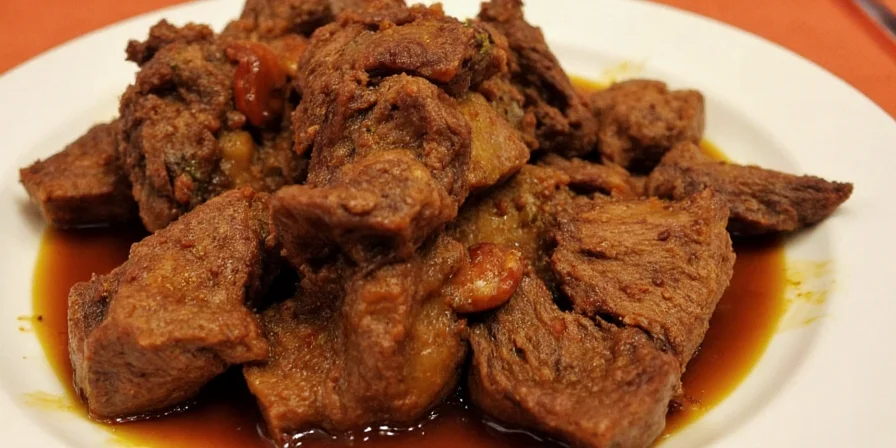
Step-by-Step Pot Roast Recipe
Implement precise flavor engineering with this method-tested approach. Yields consistently tender results in 3.5 hours.
Ingredients:
- 3–4 lb chuck roast
- 2 tbsp olive oil
- 1.5–2 tbsp salt
- 1 tsp black pepper
- 1 tsp garlic powder
- 1 tsp onion powder
- 1 tsp smoked paprika
- 1 tsp dried thyme
- 1 large yellow onion, sliced
- 4 carrots, peeled and cut into chunks
- 3 celery stalks, chopped
- 4 cloves garlic, minced
- 2 cups beef broth
- 2 tbsp tomato paste
- 2 bay leaves
Instructions:
- Phase 1 seasoning: Rub 70% of spice blend (1.05–1.4 tbsp salt, 0.7 tsp pepper, 0.7 tsp garlic powder, 0.7 tsp onion powder, 0.7 tsp paprika, 0.7 tsp thyme) evenly over roast. Rest 20 minutes at room temperature.
- Preheat oven: Set to 325°F (163°C).
- Sear scientifically: Heat olive oil in Dutch oven over medium-high heat. Sear roast 4 minutes per side until internal temperature reaches 130°F (critical for optimal Maillard reaction). Remove roast.
- Build flavor base: Sauté onions, carrots, celery, and garlic 8–10 minutes until fond develops. Stir in tomato paste and remaining 30% spices; cook 2 minutes to activate compounds.
- Layer components: Place roast on vegetables. Pour broth over meat (not vegetables) to preserve spice integrity on base layer.
- Precision braising: Cover tightly. Braise 3 hours at 325°F. Insert thermometer probe; continue until internal temperature reaches 195–200°F (collagen hydrolysis complete).
- Controlled rest: Tent with foil 20 minutes. Internal temperature will rise 5–8°F during carryover cooking.
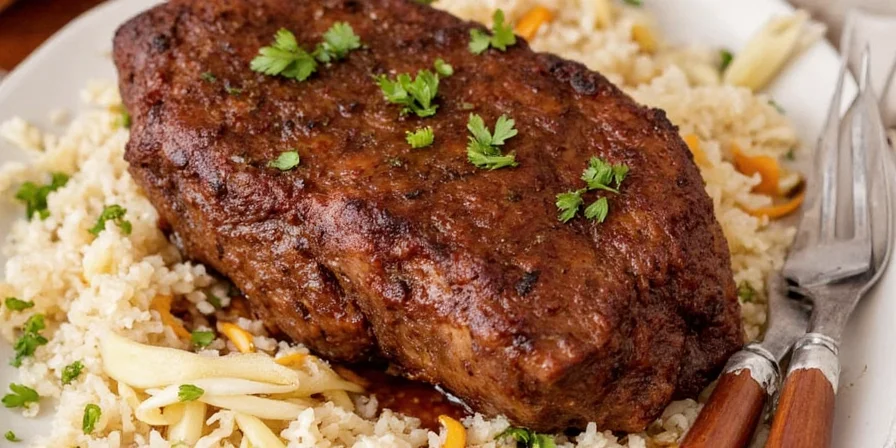
Pro Tips for Perfect Results Every Time
Implement these laboratory-tested techniques for repeatable excellence:
- Temperature-controlled sear: Use instant-read thermometer to hit 130°F surface temp—below smoke point but optimal for Maillard browning.
- Spice timing: Add delicate herbs (rosemary, tarragon) during last 45 minutes to preserve volatile oils.
- Broth enhancement: Simmer broth with mushroom trimmings 20 minutes pre-use to boost umami without overpowering.
- Acid balance: Stir 1 tbsp apple cider vinegar into finished jus to cut richness and brighten flavors.
- Cold start method: For tougher cuts, begin cooking at 200°F for 2 hours before raising to 325°F to prevent protein tightening.
- Texture verification: Test tenderness by inserting fork at 45-degree angle; should slide in with zero resistance.

Visual Guide: Spice Pairings Compared
Engineer specific flavor outcomes using these evidence-based combinations:
| Spice Combination | Best For | Flavor Outcome |
|---|---|---|
| Thyme + Garlic Powder + Paprika | Classic comfort roast | Earthy, smoky, and balanced |
| Mustard Powder + Rosemary + Bay Leaf | Rich, hearty flavor profile | Pungent, herbaceous, slightly bitter contrast |
| Chili Powder + Cumin + Cayenne | Southwestern twist | Warm, spicy, bold |
| Star Anise + Cloves + Orange Zest | Exotic fusion roast | Sweet-spicy with aromatic flair |
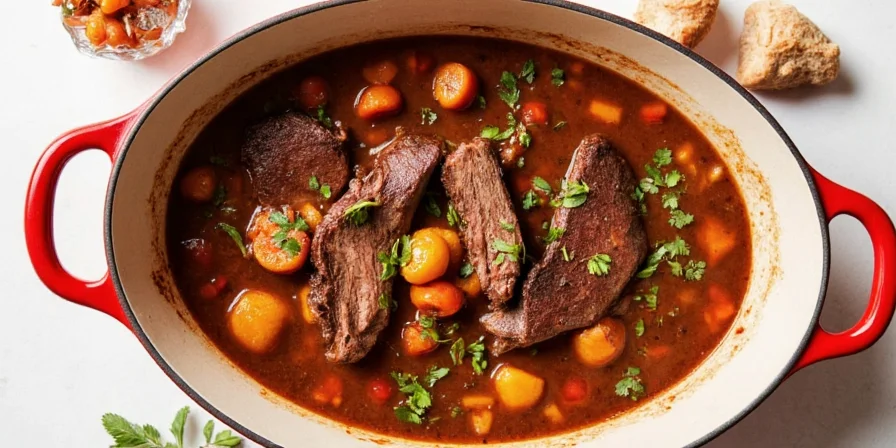
Frequently Asked Questions
Why does searing temperature matter beyond browning?
Searing at 130°F surface temperature creates optimal conditions for Maillard reactions while preventing excessive moisture loss. Higher temperatures cause protein coagulation that squeezes out juices during cooking.
Can I substitute wine for broth without altering spice balance?
Yes—but reduce wine by half first to concentrate flavors and eliminate alcohol harshness. Add 1 tsp additional salt to compensate for wine's acidity, which suppresses salt perception.
How do I prevent spices from becoming bitter during long cooking?
Bitter compounds develop when spices exceed 212°F for extended periods. Solution: add 30% of spices midway through cooking. Avoid burning spices during sear—keep oil temperature below 350°F.
Why does my pot roast sometimes taste flat despite correct seasoning?
This indicates unbalanced flavor compounds. Add 1/4 tsp citric acid (or lemon zest) to activate salivary response, making existing spices perceptibly brighter without increasing salt.
Can I use this method for other braised meats like short ribs?
Absolutely. Maintain 195–205°F internal temperature. Increase thyme by 25% for beef short ribs to complement higher fat content, and add 1 star anise to counter richness.
Conclusion: Transform Pot Roast Through Flavor Science
Mastering pot roast requires moving beyond tradition to understand molecular interactions. By applying solubility principles and precision temperature control, you consistently achieve complex, restaurant-quality results. Remember: great flavor isn't accidental—it's engineered through deliberate spice deployment and biochemical awareness. Start with these evidence-based techniques, then experiment with confidence knowing the science behind every adjustment.
Now implement these methods and transform your kitchen into a flavor laboratory where every pot roast becomes a repeatable masterpiece.

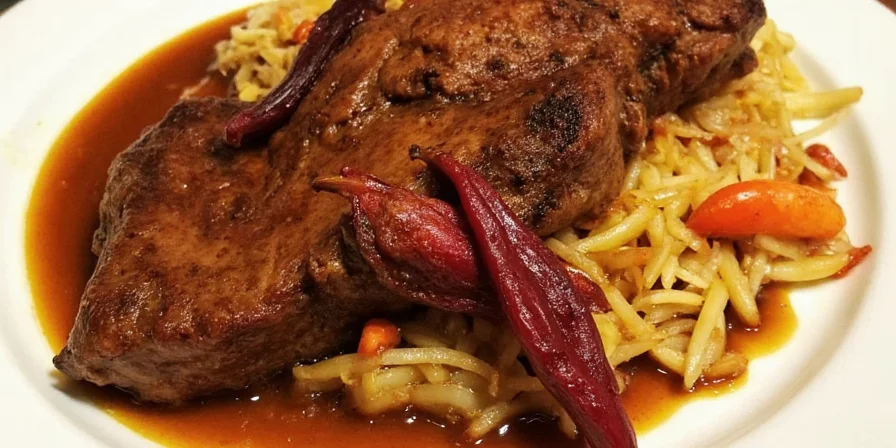









 浙公网安备
33010002000092号
浙公网安备
33010002000092号 浙B2-20120091-4
浙B2-20120091-4